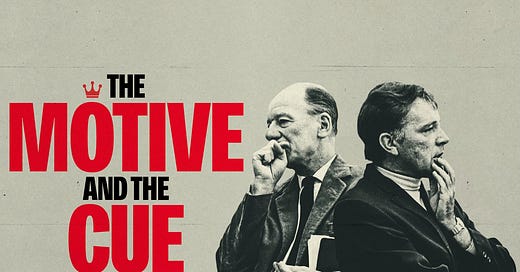Review: The Motive and the Cue
A review of the hit Jack Thorne play about Sir John Gielgud directing Richard Burton in Hamlet, as seen via NT Live.
The first thing to come up against is the fear of not knowing which cue is the right cue as I, like so many of my generation and class, have to seek reference materials when it comes to cue, queue, que, kew, Kew, KEW, Cue, and queueueue. Second problem is what a brilliant bad title this is for a play. I can never remember it, and yet it is an exquisite Shakespeare quote, full of richness, allegory, and the kind of depths writers love to nick from the Bard to give them an intellectual duvet to rollick around in.
Maybe, sometime in the future, we could start a thread nominating the best books, plays, and films, that have purloined a line from Shakespeare for a title.
I wouldn’t normally fixate on the title of a play for so long, but for all the while I wanted to see The Motive and the Cue, I have had trouble communicating it to people. I would eventually end up with “the Burton-Gielgud play”, which seemed to serve the purpose.
Maybe, sometime in the future, we could start a thread nominating plays with clear titles referencing the two main characters locking horns on stage (“Frost-Nixon”) and the more abstruse of that kind (“Best of Enemies”).
The Motive and the Cue (as I will generously refer to it) fictionalises the rehearsals of Sir John Gielgud directing Richard Burton in a 1964 Broadway production of Hamlet. Yes, a rehearsal of a play within a play that sometimes has bits of the play in it and, of course, there is the play within a play within a play. As the rehearsal process begins to unravel and the personalities clash and learn this might not be the smooth road to a masterpiece some envisioned, we are treated to an exploration of the collision of two generations of theatre Olympians, and through it the very idea of what theatre should be and how it should be respected. Gielgud the stately grandfather of Shakespearean declaration comes up against the fireworks of the angry young man Burton. Sam Mendes’ direction really over eggs the pudding on demarcating those battle lines. Gielgud is ethereally tender, caressing each line of Hamlet like a dying lover as he tries not to show Burton how to do it. Burton, however, is almost unlistenable so turgid and angular is his delivery of the scripture. The suspicion, in fact, is that Johnny Flynn could be overacting. Mark Gatiss as Gielgud, though, has never been better.
Burton here is a drunk, and a bore and a bully and a brat to boot. Gielgud is the passive statesman watching the world go by in a soft fuzz of English melancholy. It is simply beautiful to watch Gatiss move around and speak those lines, and the climax of the first half, with Gielgud alone on stage, is the highlight moment.
Perhaps Mendes and Thorne are so in love with Gielgud and what he stands for, now we look at hime from the vacuous fast-paced modern world, that Burton was never likely to get a look in. There is a longing in performance, direction, and writing, for the days of yore(ick?).
Gatiss, too, it must be said, gives the only real acting performance of the leads. Flynn’s Burton, and Tuppence Middleton’s Liz Taylor, are impersonations, not evocations, of iconic figures. Flynn’s Burtonesque is impressive, but it is accurate in the way cartoons are accurate. (And as Bob Hoskins taught us, it aint so easy spending two and half hours with Roger Rabbit). Middleton goes the other way in her impersonation, though, and gives us no flavour whatsoever of the real Taylor. She is a stereotype Golden Age Hollywood star; but as for Taylor specifically, you don’t hear her, you don’t see her, and you don’t feel her.
But The Motive and the Cue is a rich and serious play for grown ups who love theatre. I would watch it again a thousand times for Gatiss’ soft, aching, spiky Gielgud, and for Thorne’s rich and ambitious script.
Oh, and one last thing… don’t listen to anyone who tells you there is no audience for theatre in Wales. The cinema in which I watched this play transmitted from London was sold out, and the NT Live stream of The Motive and the Cue has been the number one topic of conversation among friends for the last week (you could say, in conversational terms, it was “trending”). From this you could infer that people want in order for them to become a “theatre audience”, is a well-written play, well-directed and well-acted. If only somebody had thought of that before.





I saw it in the theatre not the cinema. That can make a difference. Anyway we will have to agree to disagree. It is definitely worth seeing however
but the cinema I saw it in had me and half a dozen others. But it was a terrific show.